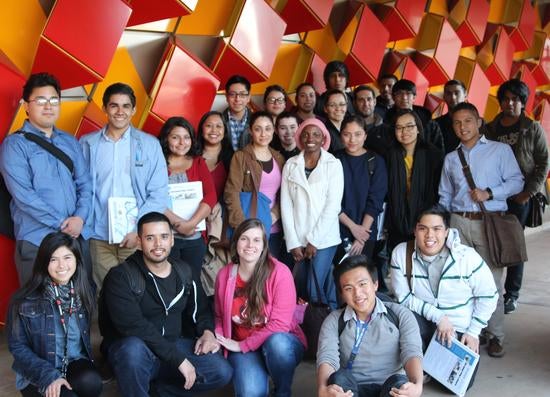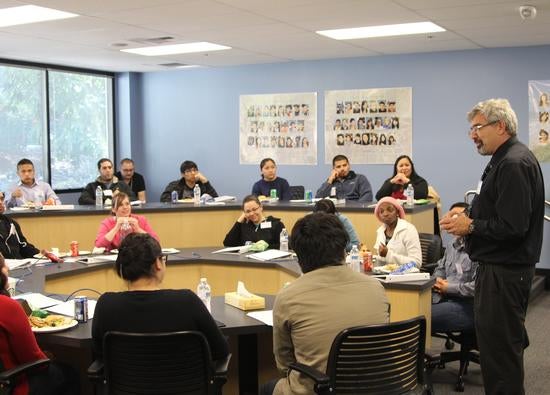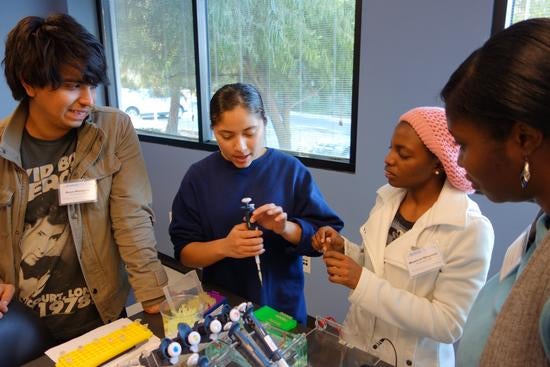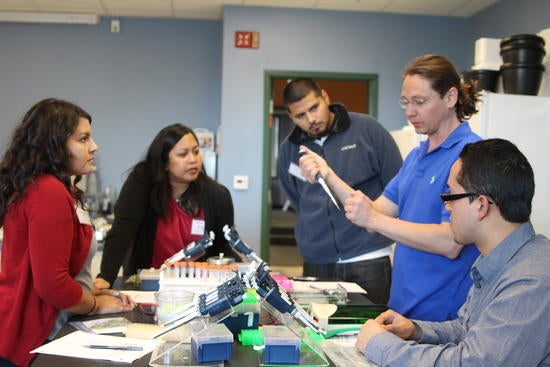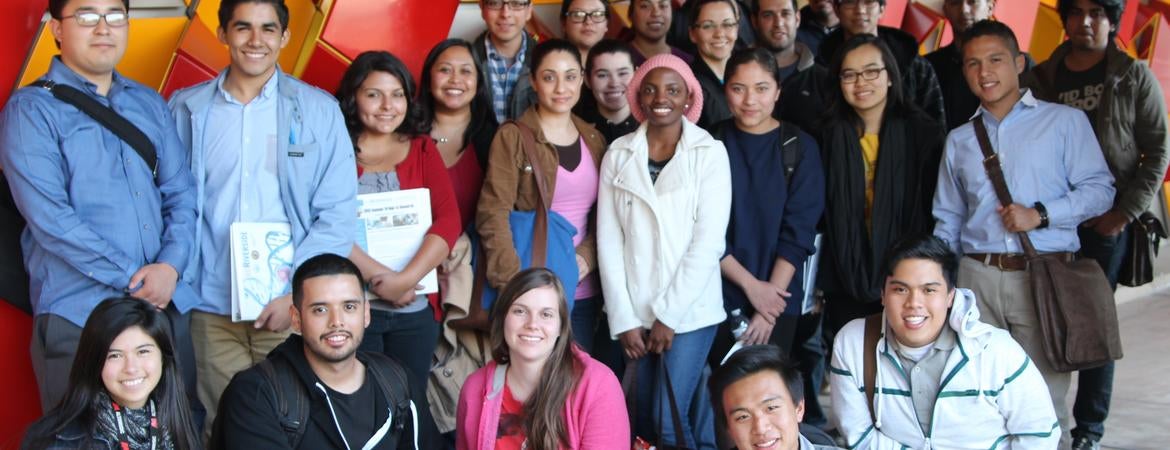
RIVERSIDE, Calif. — Twenty-eight students from three local colleges spent the bulk of Saturday, Feb. 23, in a laboratory at the University of California, Riverside to gain the kind of university-level research experience they likely will remember for a long time.
Selected from Mount San Jacinto College (MSJC), Moreno Valley College (MVC) and Riverside City College (RCC), the students are participating in a four-week research project, called the “Sequence to Success DNA Barcoding Challenge,” that was launched on Saturday. The project aims at surveying the diversity of Salvia — a common drought tolerant plant — in Western Riverside County. The participants characterized Salviaplant communities from their respective campuses.
The visiting students analyzed leaf samples in the Neil A. Campbell Science Learning Laboratory. In the process, they learned DNA extraction and sequencing, used DNA barcoding software to identify species, and applied various other molecular biology and bioinformatics techniques on the leaf samples they had collected.
The students, who are U.S. citizens or permanent residents and meet Hispanic or low-income criteria as defined by the U.S. Department of Education, will present the results from their work at a special poster presentation to be held at UC Riverside on March 23.
Their four-week research experience is supported by a five-year $3.93 million grant to UCR in 2011 from the Department of Education. It aims specifically at supporting underrepresented student populations in the science, technology, engineering, and mathematics (STEM) fields, steering them on to a path leading to bachelor’s and advanced degrees. MSJC, MVC and RCC are formal partners with UCR for the duration of the grant.
“This grant aims to increase the number of community college students transferring into the STEM fields and improve their success and retention in the university,” said Richard Cardullo, a professor of biology, the faculty director of the Hispanic-Serving Institution (HSI)-STEM Program in the College of Natural and Agricultural Sciences (CNAS) and the co-principal investigator of the grant. “The idea is to introduce research to community college students who are majoring in the STEM fields, and bring to their attention the advantages of a four-year university like UCR. If we can spark their interest in science and technology, we’ll have succeeded.”
Sophomores in the UCR Dynamic Genome Program worked alongside the visiting students to guide the research. The visitors also received rigorous coaching from James Burnette III, a molecular biologist and academic coordinator in CNAS who develops research-intensive undergraduate lab courses; and Alejandro Cortez, a laboratory assistant in the Department of Botany and Plant Sciences.
Jose Luis Orozco of MVC, who participated in the Sequence to Success DNA Barcoding Challenge on Saturday, is interested in becoming a research physician, spending time in the clinic and conducting research in a laboratory environment.
“This opportunity took me one step closer to my goal,” he said. “I plan to participate in research while in college so it benefits me now as I plan to make the transition to a four-year university.”
Participant Giovanna Jocelyn Mendez, also of MVC, has a dream: to understand math and science.
“Knowing the language of mathematics has opened a completely new world of possibilities,” she said. “I want to become a chemical engineer because it plays with math, physics, and chemistry. The research experience at UCR exposes me to the potential that the sciences have for me.”
Maureen Wanjiru Njuguna of MSJC would like to transfer to a four-year institution and earn first a bachelor’s degree and later advanced degrees in chemical engineering.
“As a chemical engineer I would like to travel back home to Kenya and work on a project in the rural areas to foster better hygiene,” she said. “The opportunity at UCR provides me the edge I need to successfully complete my undergraduate studies and the upper hand I need to apply to both the master’s and doctoral programs.”
Joseph Renteria of RCC wants to become a physician specializing in oncology or emergency medicine. Participating in the Sequence to Success DNA Barcoding Challenge allows him, he said, to demonstrate his scientific skills in a discipline he is passionate about.
“It provides an opportunity to gain an advantage over other students with the same goals,” he said.
James Burnette III (second from right), a molecular biologist and academic coordinator at UC Riverside, instructs some of the participants of the Sequence to Success DNA Barcoding Challenge.PHOTO CREDIT: STEM CONNECTIONS, UC RIVERSIDE.
Cardullo said the event on Saturday was an enormous success and far exceeded his expectations.
“We had 28 highly motivated students who get what it means to be serious about education,” he said. “These young people are intensely curious and coachable, with their eyes set firmly on the next steps they will take in their career paths.
“UCR well reflects the changing demographics in the country and California,” he added. “We have a well documented broken pipeline of STEM-educated workers in the country that needs to be fixed. We at UCR are ahead of many other universities in addressing this problem through events like the Sequence to Success DNA Barcoding Challenge.”
Approximately 50 students in total from MSJC, MVR and RCC applied to take part in the Sequence to Success DNA Barcoding Challenge. The selected students received no stipend and incurred no fees to participate.
“The success of the event on Saturday has encouraged us to host the research experience every year of the remaining duration of the grant,” said Nhi Viet Tran, the coordinator for STEM Connections in CNAS. “We also plan to expand the program beyond the life sciences by including the physical sciences and the chemical sciences.”
